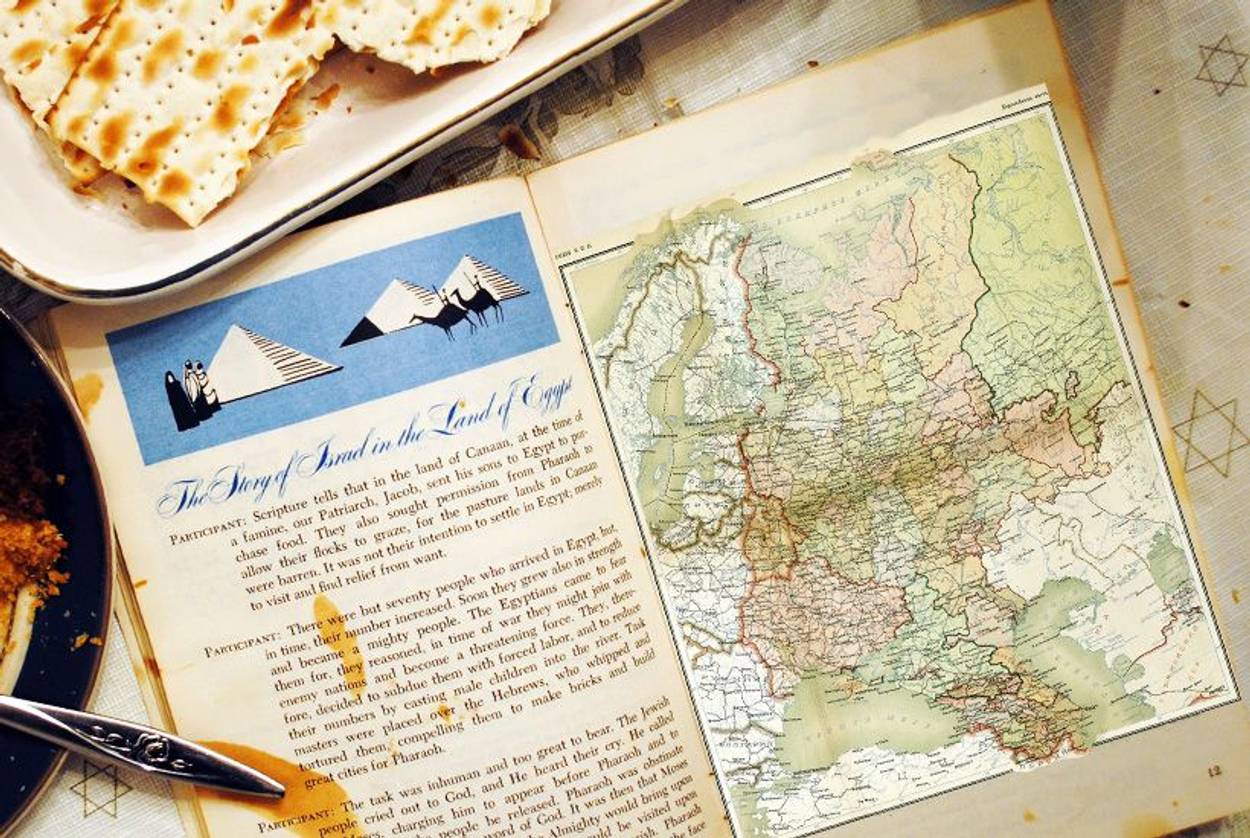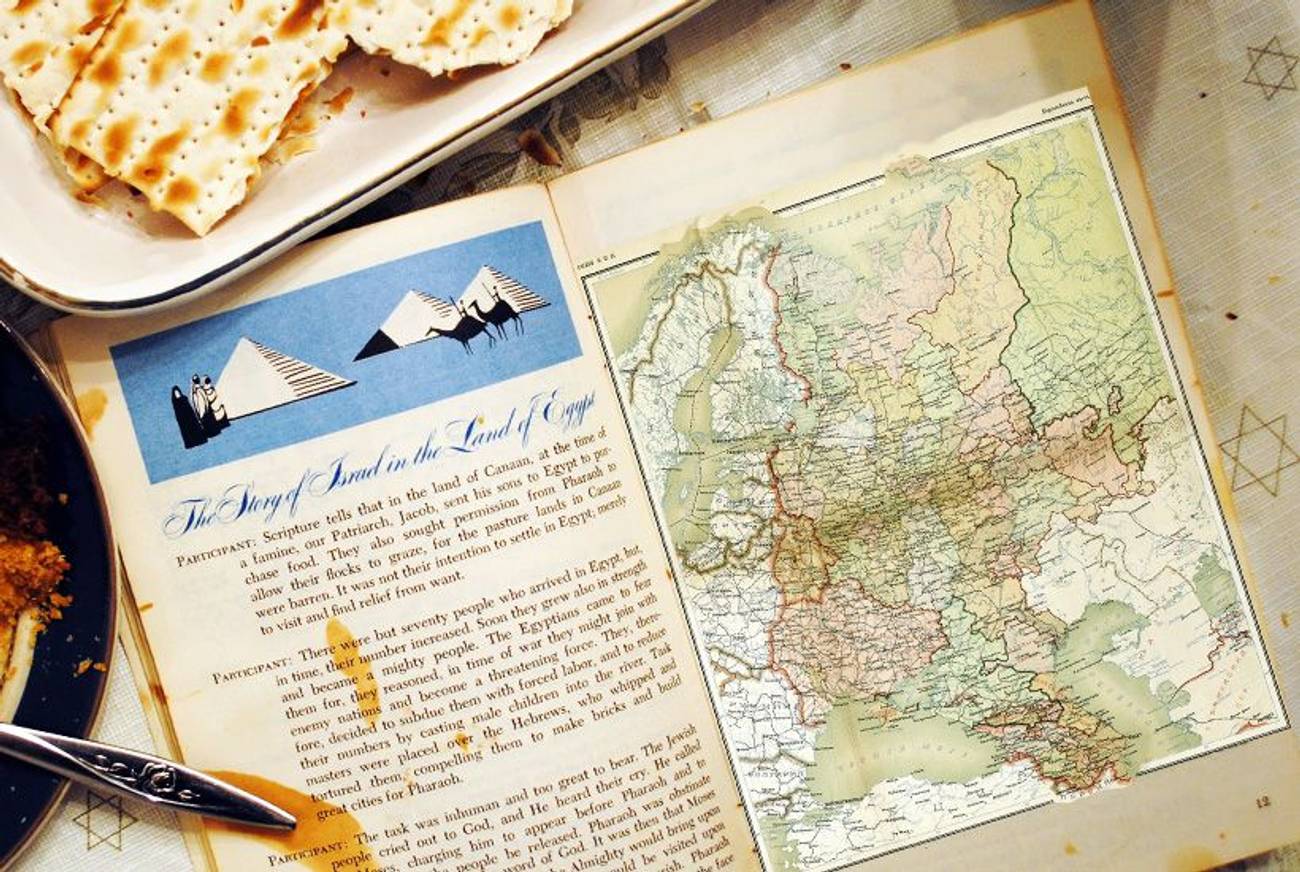Our Family’s Twin Passover Tales: Escaping From Egypt and the Soviet Union
My father used to share his harrowing childhood memories every year at the Seder. Now I make sure his memories will survive.




There are two tales that we would tell in our home on Seder night when I was growing up in Pittsburgh: the Exodus from Egypt and the “Escape from Velizh.” The first was read from a Haggadah over matzo and bitter herbs; the second was told by my father over a bowl of red beet borscht.
It was Passover 1929, in Stalin’s Soviet Union; the Poupko children—including my father, who was 12 at the time—were awakened frantically in the middle of night and got dressed amid ominous threatening shushing, rushing to avoid capture. Their father, the rabbi of the town of Velizh, was under house arrest with an impending sentence to Siberia looming over the family’s collective head. The household goods were left behind, but the family made it; they crossed the border into Poland and met up with their three sons who had been dispatched to Radun, to the Yeshiva of the Chofetz Chaim, nine years earlier. A dramatic reunion it was, with the boys now men. No one was arrested, and no one was sent off to Siberia.
Every Passover my father recounted this “Escape from Velizh,” until nine years ago. How was this year different from all other years? This year there would be no telling, because my father had lost his memory. The tragedy and pain were almost unbearable; a daily mean-spirited joke told over and over again. A Jew without a memory, like a Torah scroll with words viciously erased.
A month before the Seder in 2005, I watched anxiously as my father took a bite of a warm poppy seed hamantasch. I bake them every Purim; my mother’s recipe, with the secret vanilla in the filling. A hugely irrational fantasy flashed through my mind: Maybe, just maybe, the taste of the long-familiar cookie would trigger a return of memory. But no such madeleine-like luck here. My father chewed on the hamantasch and asked:
What day is it?
What time is dinner?
Who sleeps in this house?
Where are the others who live here?
The stories of Velizh, of Nadia the cow, and of herring with black bread were all gone. The trip across the ocean on the not-yet-infamous S.S. St. Louis, the confinement on Ellis Island, and the long steamy summer in a New York hospital as a non-English speaking refugee stricken with polio, casted and in traction—these stories were all gone now. Meetings with the Jewish greats of the previous century, the pious and the political—the Rogochover Elui, the Chofetz Chaim, Rabbi Soloveitchik, Abba Eban, Golda Meir and Menachem Begin, Natan Sharansky—all gone. The dissertation, “Adult Jewish Education in America” circa 1958, the books, the articles, and the 60-plus years of sermons were all forgotten.
I began to crochet a blanket, a blanket of memory, for my daughter, who was nine months pregnant. During many dark, rainy Seattle nights my father and I sat in the living room while I worked on it. Between us, Yiddish music played plaintively. Mandy Patinkin sang over and over:
In the temple, in the corner of a chamber,
The widow, a daughter of Zion, is sitting all alone.
As she rocks her only son, Yidele, to sleep,
She sings him a pretty song, a lullaby.
My hands guided blue, navy, and white yarn into small squares that would be sewn together. The blanket would warm my first grandchild, a boy.
My father started asking me questions:
What is that you are doing with your hands?
Making a blanket.
A blanket?
Peshy is expecting a baby.
Peshy?
My daughter. Your granddaughter, named for your mother, Pesha Chaya Poupko.
My mother? Where is my mother? I have not spoken with her for many weeks.
And so on, evening after evening, until the blanket was finished. When little Avidan was born, he was brought to his bris wrapped in this blanket of memory. Every square stitched with the bittersweet pain of questions and answers, over and over again.
Pesha your granddaughter, named for your mother.
Passover is a holiday of memory like no other. We remember the slavery, the pyramids, the bricks, the suffering. We recall the redemption, the plagues, the splitting of the sea, and the approach to Sinai. We recall, like only our people can, that it was not only our forefathers who came out from Egypt. We too came out from Egypt. It was we who were slaves and we who were freed. We remember.
As Passover loomed that year, my father knew that his memory was gone. The pain showed in his holy white-bearded, green-eyed face. The Seder would come and there would be no stories of matzo-making in Velizh. We would not hear about the rabbis dressed in white caftans harvesting the wheat as they the sing the Hallel to the Almighty, no harrowing tales of cracking the ice on the Dvina river to get the frigid water for the matzo dough—the mayim shlanu—no recollections of watch gears hooked onto a wooden stick in the hands of a little boy rolling it back and forth over and over again, determined to make sure that the tiny holes would prevent the dough from rising. No story of the escape from Velizh.
I told my father every day not to worry, not to be afraid. You might not remember everything, but I will be your memory, I told him. I will tell the story, as if I had come out from Velizh.
Nine years later—four years after my father’s death—this is still our tradition. This Passover, our family will hear the four questions asked by the little boy who was once wrapped in that blanket of memory. He, his siblings, and cousins will sit at the Seder and speak of the Exodus, and then I will tell them about the escape from Velizh as bowls of steamy borscht are brought to the table.
Rivy Poupko Kletenik is in her eighth year as Head of School of the Seattle Hebrew Academy.